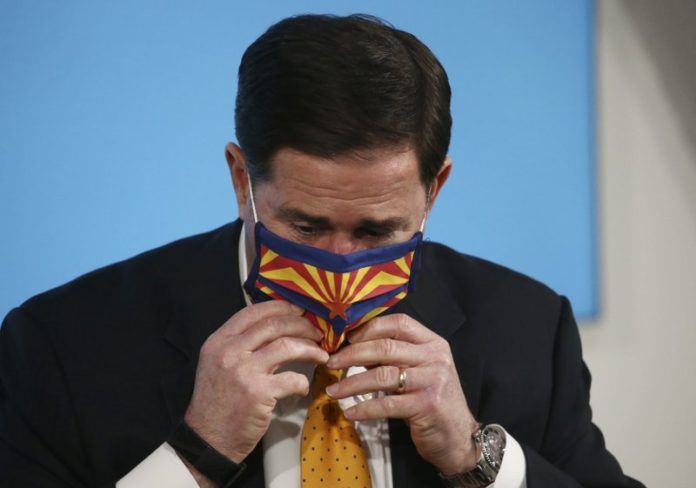
Some Arizona hospitals halted elective surgeries Thursday and a Scottsdale nightclub faces what appears to be the first misdemeanor of failure to enforce social distancing polices as the number of confirmed COVID-19 cases kept rising after Republican Gov. Doug Ducey’s decision to lift stay-home restrictions in May.
Health officials have attributed the rising number of reported cases to both increased testing and community spread of the disease. The state Department of Health Services reported 3,056 additional COVID-19 cases Thursday, the fourth day in a week with daily increases over 3,000.
The numbers “continue to go in the wrong direction,” Ducey said Thursday. “Our time of getting hit is right now: June, July and August.”
“We can expect our numbers will be worse next week and the week after,” the governor added.
Arizona has confirmed 63,030 cases with 1,490 deaths, including 27 reported Thursday. The department reported that a record 2,453 people were hospitalized for COVID-19 as of Wednesday, including 611 in intensive care beds and a record 415 on ventilators.
The number of infections is thought to be far higher because many people have not been tested, and studies suggest people can be infected with the virus without feeling sick.
At an afternoon news conference, the governor pushed back against questions about his position on the use of masks and his attendance at President Donald Trump’s campaign event held indoors this week at a Phoenix church. Many of the 3,000 people who attended did not wear face coverings. Ducey noted he did wear a mask.
Meanwhile, University of Arizona President Robert Robbins said the increases were alarming and that officials would monitor conditions before deciding if students will return to the Tucson campus in August.
Robbins said he’d feel comfortable reopening Aug. 24 if face coverings, social distancing and staying at home flatten the virus’ growth curve.
In Tempe, Arizona State University President Michael Crow told faculty members and other employees in an email Wednesday the university remains on track for students to return to ASU campuses in late August.
Scottsdale police Thursday announced the case against the nightclub Riot House, saying officers saw both customers and employees “not practicing physical distancing, not wearing face coverings and not complying with their plan.”
Riot Hospitality Group, which operates Riot House among other bars and restaurants, did not immediately respond to a voice message seeking comment.
It appeared to be the first such case against an Arizona business during the pandemic on accusations of failure to follow its own social distancing rules.
Dignity Health is halting elective surgeries starting Saturday at St. Joseph’s hospital near downtown Phoenix and the smaller Westgate hospital in the West Valley, spokeswoman Carmelle Malkovich said. At hospitals in Chandler and Gilbert, officials are closely watching planned elective surgeries that might result in a hospitalization, she said.
An official with Honor Health, which operates hospitals in Scottsdale and North Phoenix, said elective surgeries are continuing.
But while Banner Health is continuing elective surgeries, it may pause them later, said Dr. Marjorie Bessel, the hospital system’s chief clinical officer.
“We might need to do a little bit more some weeks if we have capacity, and other weeks, we’re going to have to do a little bit less,” Bessel said in a statement. “It’s going to be a constant managing of the elective surgeries.”
Yavapai Regional Medical Center spokesman said the Prescott hospital was restricting elective procedures and evaluating them daily and not planning to accept transfers of patients from hospitals in metro Phoenix or elsewhere in Arizona, The Daily Courier reported.
The state March 19 restricted elective surgeries to save hospital capacity and personal protective equipment for use in treating COVID-19 patients, but on May 1 allowed the procedures to resume as officials said hospitals had enough capacity and the ability to add more beds.
Ducey last week allowed counties and municipalities to require people to wear face coverings in public, and many have done so, including in metro Phoenix and Tucson.
In California, Gov. Gavin Newsom said Thursday he is not considering a travel ban or quarantine order for travelers coming from neighboring Arizona or other states seeing higher infection rates than California. Newsom noted California has sent 14 million masks to Arizona to help fight the spread of the virus through a partnership with the Federal Emergency Management Agency.
For most people, the coronavirus causes mild or moderate symptoms, such as fever and cough that clear up in two to three weeks. But for some — especially older adults and people with existing health problems — it can cause more severe illness, including pneumonia and death.
Republished with the permission Associated Press.














